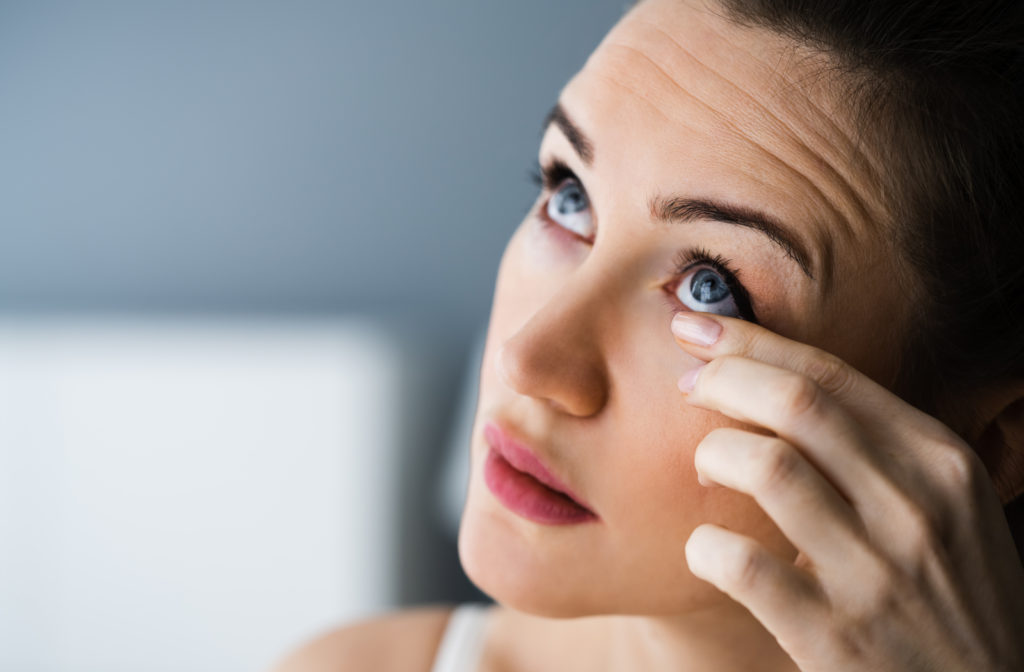Dry eyes are irritating and uncomfortable. And you could be making your symptoms worse without even realizing it.
Understanding why your tears are important, the signs and symptoms to monitor for, and what could be making your dry eyes worse is important when finding a solution to bring you long-lasting comfort.
If you suffer from chronic dry eye, your optometrist can diagnose dry eye during a comprehensive eye exam and create a treatment plan best suited for you.
What is Dry Eye?
Dry eye disease is a chronic condition that occurs when the surface of your eye lacks moisture. The lack of moisture is a result of not producing enough tears, or the quality of your tears is stopping them from functioning properly.
If you know the symptoms of dry eye disease all too well, you are not alone. Around 30% of Canadians experience symptoms associated with dry eye. The good news is dry eye therapy is within reach.
The Importance of Your Tears
Your tears are important to your overall eye health. They are responsible for washing away dirt and debris that could otherwise lead to eye damage or infection. Keeping a consistent layer of tears on your eye is essential to overall comfort and clear vision.
When you blink, a tear film covers the surface of your eye, locking in moisture. For your tears to function correctly, the tear film needs to be made up of 3 components. Let’s break it down:
- An oily component produced by the meibomian glands and is responsible for making sure your tears don’t dry up too quickly
- A watery component produced by the lacrimal glands and is responsible for washing away dirt and debris from the eye
- A mucous component produced by cells in the conjunctiva and is responsible for spreading your tears over the surface of your eye and making sure they stick
Your tears need to do their job so you can avoid the irritation of dry eye symptoms. If the components of your tear film are affected, you can experience discomfort.
Signs & Symptoms of Dry Eye
Now that we’ve gone over what dry eye is and why your tears are important for overall eye health, we can answer the question: what does dry eye feel like?
Symptoms can include:
- Burning or stinging sensation
- Itchy or gritty feeling
- Red eyes
- Sensitivity to light
- Blurry vision
- Feeling like something is in your eye
- Irritation when wearing contact lenses
- Excessive watery eyes in response to the dryness
Talk with your optometrist about any symptoms you may be experiencing. A thorough eye exam can help stop dry eye disease in its tracks and prevent you from contributing to the problem.
4 Things Making Your Dry Eyes Worse
You could be making your dry eyes worse without even knowing it.
Open communication with your optometrist about the medications you take and your lifestyle can help get to the root of your dry eye. The following are 4 common things that could be making your dry eyes worse.
Number 1: Low-Blinking Activities
Blinking is important because it helps spread your tear film across your eye. Blinking also clears debris from your eye to protect it and brings in oxygen.
If you’re not blinking enough throughout the day, it can cause:
- Your cornea to swell because it needs oxygen from your tear film
- Dry eye symptoms because your tear film isn’t being replenished
- Risk of eye infection due to debris not being washed out
You might be blinking less when you are focused on something. Low-blinking activities include:
- Staring a computer screen
- Scrolling through your phone
- Watching TV
- Reading
- Driving
If your eyes need a much-deserved break, you can practice the 20/20/20 rule. Every 20 minutes, take a 20 second break by staring at something 20 feet away.
Number 2: Certain Medications
If you are taking certain medications, they could be contributing to your irritation. Medications that can contribute to dry eye syndrome include:
- Antihistamines
- Decongestants
- Antidepressants
- Hormone replacement therapy
- Diuretics for high blood pressure
- Beta-blockers for high blood pressure
- Certain Parkinson’s disease medications
It’s important to talk with your eye doctor about your medical history in order to accurately assess and diagnose any eye conditions.

Number 3: Environmental Factors
The environment you live in can impact your eye health. Wind, sun, smoke, and dry air can all be contributing factors to your dry eye symptoms.
You can lessen the environment’s impact on your dry eyes by using a humidifier or opening a window to keep the air moist. You may also want to consider an air filter if there is lots of dust where you live or work and protect your eyes from sun and wind with well-fitted sunglasses.
Number 4: Poor Nutrition
Lack of Omega-3 fatty acids in your diet can be making your dry eyes worse. Omega-3s can help decrease inflammation and improve the function of your meibomian glands, which are responsible for producing the oil in the makeup of your tears.
Omega-3s are a type of fat your body can’t produce itself. You can add Omega-3s to your diet with supplements or foods such as salmon, nuts, and leafy greens.
Talk to an Expert
It may seem easy to diagnose your dry eyes yourself with over-the-counter eye drops or other at-home methods, but a comprehensive eye exam from your trusted eye doctor can find the source of your symptoms without guessing.
Don’t let your uncomfortable dry eyes get in your way. Queensway Optometric Centre offers dry eye therapy to bring your relief.


